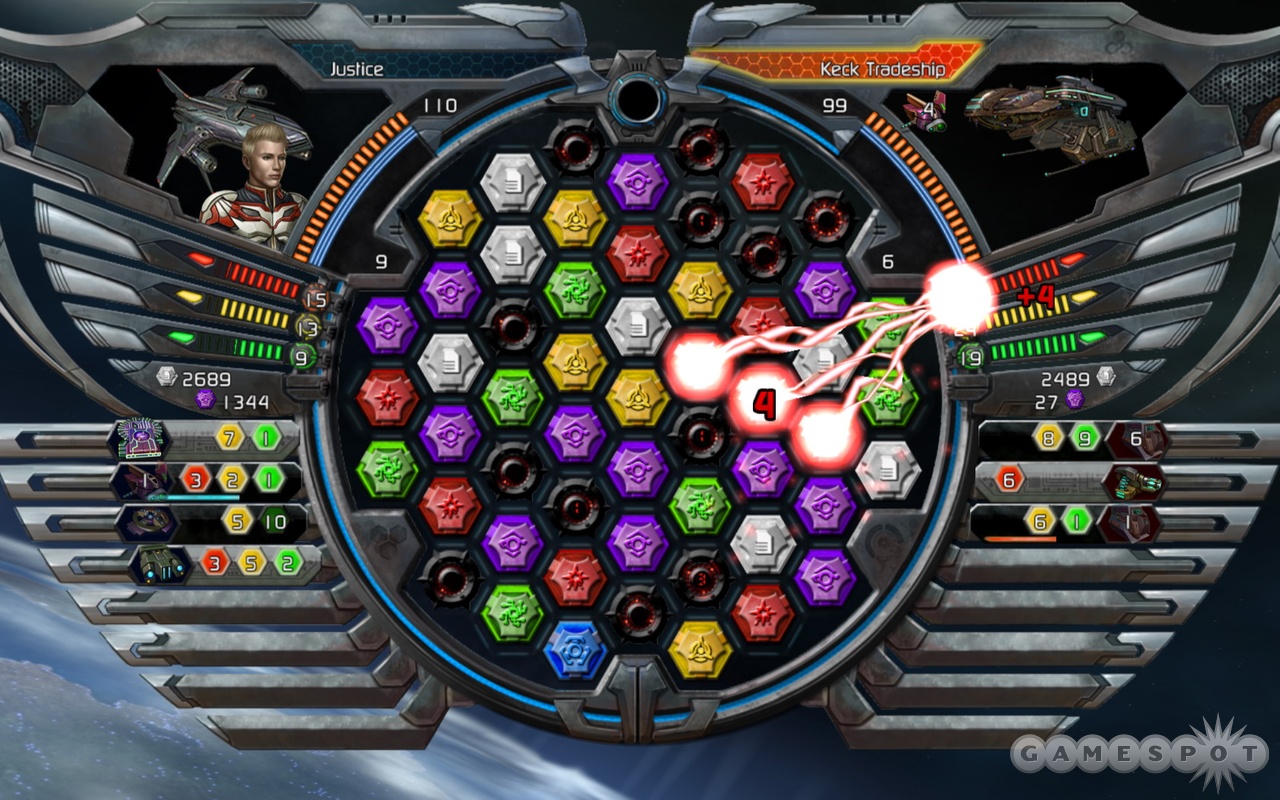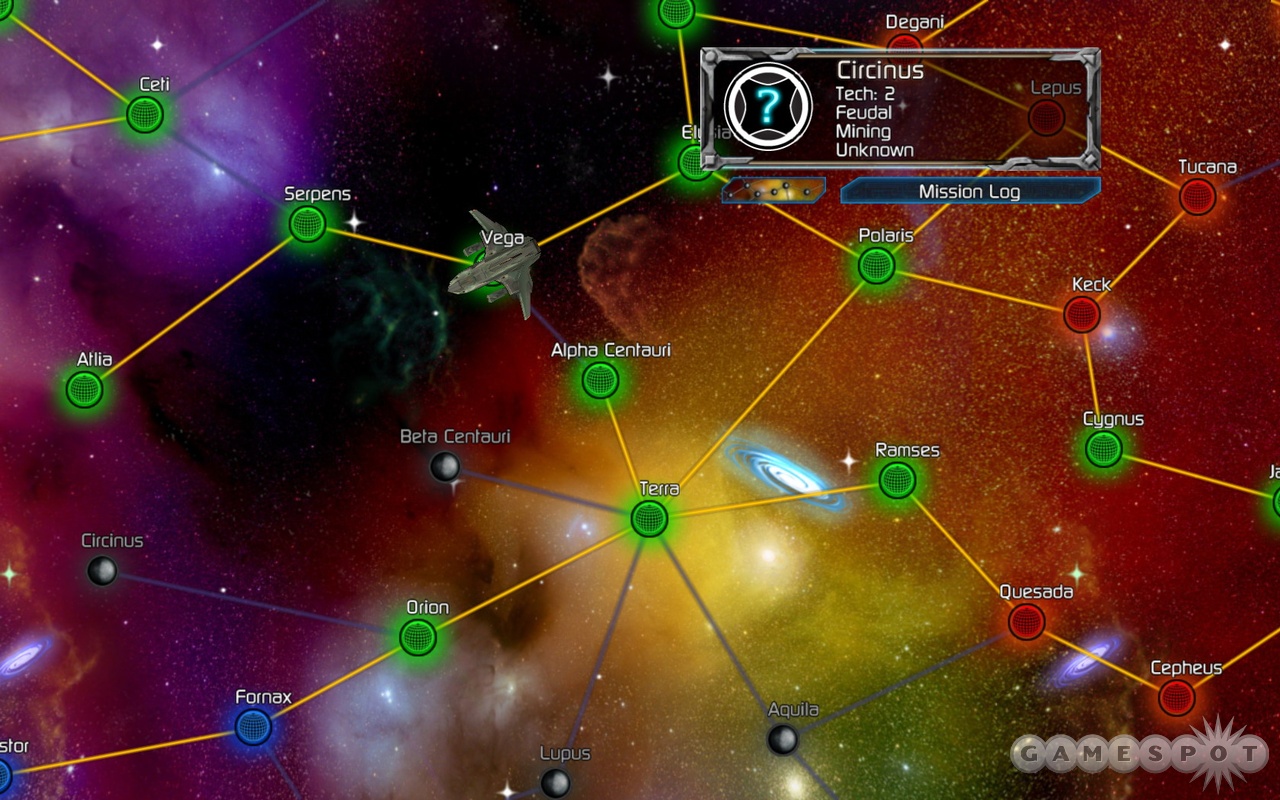Like its predecessor, Puzzle Quest: Galactrix is a role-playing game of sorts in which turn-based battles play out on something resembling a Bejeweled board. Galactrix takes Puzzle Quest out of its original fantasy setting into the realm of sci-fi and, at first glance, it appears to retain and improve on much of what made the first game great. The new hexagonal playing field with variable gravity initially feel like an exciting innovation, but ultimately they're the game's undoing because blind luck now plays much too big a part in determining the outcome of almost every encounter.
Almost all of your time in Puzzle Quest: Galactrix is spent moving hexagonal pieces around in an attempt to create same-color lines of three or more. In the original Puzzle Quest, in which the pieces were square, this was quite a challenge at times, and it wasn't uncommon for the board to be reset when it became impossible for any move to be made. In Galactrix this is never an issue, because now that you can move pieces in six directions you're generally spoiled for choice when looking to create a line. Thankfully, there's still some skill involved in deciding which lines to play, not least because different-colored gems serve different purposes; for example, blue gems replenish your ship's shields, red gems are used to power weapons, and white gems earn you experience points. Special equipment items--the equivalent of the original Puzzle Quest's character spells--also consume a combination of the red, yellow, and green gems that you've collected anytime you use them to hamstring your opponent or to give yourself a temporary advantage, and whereas creating lines of skulls dealt damage to your enemy in the first game, you now need to create lines of bombs for the same result.

The most intriguing addition is the way that gravity, or the lack of it because you're in space, is handled. In the first game, new pieces always dropped in from the top of the board to replace those used in lines, but in Galactrix they can come in from any of the playing area's six sides. The direction of gravity is determined by the direction of your last move, so even after deciding which two pieces you want to trade places, you have to think about which one you want to reposition first. There's so much strategizing going on that the best battles in Puzzle Quest: Galactrix can last for close to ten minutes, but given that every move causes a number of random pieces to appear on the board, far too many of those battles are decided by lengthy combos or strings of bombs that there's no way to plan for. Imagine playing a game of chess against a similarly skilled opponent with the knowledge that, at any time, a third party could simply sweep all of the pieces off the board and declare one of you the winner, and you have some idea of how the battles play out here. It's annoying if you lose, and it's unrewarding when you win.
When you're not doing battle against space pirates or any of the other factions that inhabit the Galactrix universe, you're using the same hexagonal playing field to unlock leapgates between solar systems, as well as crafting items, mining asteroids, and even haggling with shopkeepers. In short, you spend almost all of your time doing the same thing. Every activity has its own set of rules--for example, to unlock a leapgate you have to match different-colored gems in a specific order and against a time limit --but they all feel very similar, and most suffer from the same dependence on luck that the battles do.
The lack of gameplay variety would be easier to stomach if there was a compelling story to justify the time that you spend navigating the huge galactic map and doing battle with most of the races that you encounter, but you won't find one here. This tale of a corporation's cloning experiment going wrong and potentially spelling the end of humankind takes hours to get going, and it's told exclusively in cutscenes that lack animation. That's consistent with what the original Puzzle Quest had to offer, but that game's characters were much more interesting and, crucially, Puzzle Quest's protagonist wasn't a jerk. Even the fact that you're trying to save all of humankind from extinction doesn't make your Galactrix persona a sympathetic one. When he (or she) isn't battling space pirates, he's undertaking missions on behalf of his self-serving crewmates, missions that include stealing sacred foodstuffs and even unborn young from species who don't appear to deserve such treatment. Even that might be acceptable if it was established at any point that you're playing as a no-nonsense mercenary or some similarly uncompromising space stereotype, but the protagonist is completely devoid of both personality and morals. Essentially, he's a character without character.

Outside of the story mode, your options are limited to multiplayer battles played either across a LAN or online against someone you've exchanged IP addresses with previously. There's no matchmaking, there's no way to communicate with one another in-game, and there's no option to set up a winning condition that would span multiple games so that, at the end of a game, you don't have to communicate with your opponents outside of the game to ask them if they want to play again. It's unfortunate that the multiplayer isn't more fleshed out because, despite luck always being a big factor in battles, the inclusion of matchmaking and leaderboards could've made online play much more compelling.
What Puzzle Quest: Galactrix lacks in good gameplay it makes little attempt to compensate for with its presentation. Outside of the crisp and colorful hexagonal playing field, visuals are limited to dull galaxy maps populated with 3D ships and planets, stills of characters engaged in uninteresting text-based conversations, and one (just one) image of a bad guy that the camera pans across and zooms in and out of during voiced narration sequences. The instrumental soundtrack, though inoffensive and occasionally quite good, also lacks consistency. One or two of the tracks wouldn't be out of place in an epic space opera, but others sound like something that Buck Rogers would dance to.
Puzzle Quest: Galactrix should have been every bit as special as its predecessor, but whereas that game's randomness was only a mild irritation when it worked against you, here it ruins the game regardless of whether or not you're losing. It's true that not every battle is decided on luck, but enough of them are that frustration will set in before you're even close to investing the tens of hours that it takes to get through the story.